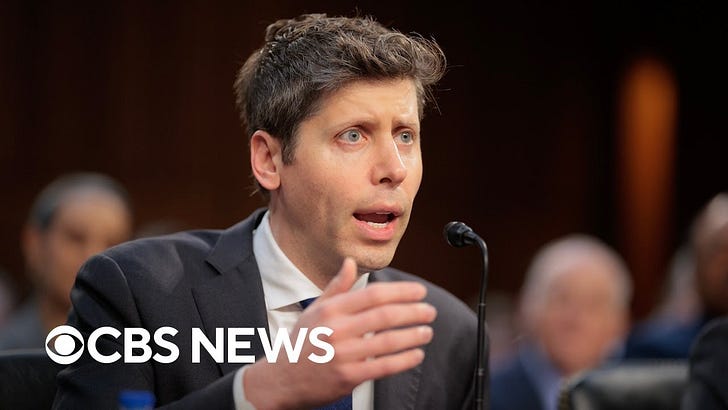
🐾 IN TODAY'S WILD
Leading CEOs across industries agree that AI is essential, not optional, predicting job shifts and industry reinvention.
A new light microscopy technique in brain research rivals electron microscopy in mapping neural connections.
Inspired by human cooperation driven by shared stories, research shows common narratives boost collaboration among AI agents while conflicting narratives hinder it.
Huawei released its first HarmonyOS laptop, and OpenAI CEO Sam Altman testified at a Senate hearing on AI's future.
📌 AI case study
Continue reading on [Wild Intelligence]
🦾 AI daily pulse
CEOs across industries are saying it loud and clear: AI is not optional, it’s essential.
"AI is coming for your jobs... including mine." - Micha Kaufman, Fiverr
"You are the copilot of your own future." - Satya Nadella, Microsoft
"Everyone at Meta is expected to learn AI." - Mark Zuckerberg
"AI will reinvent every industry." - Sundar Pichai, Google [Entrepreneur]
—See my take belowA new light on neural connections. In collaboration with the Institute of Science and Technology Austria (ISTA), we published in Nature the first-ever method for using light microscopy to comprehensively map all the neurons and their connections in a block of brain tissue. The key finding from this validation experiment is that this approach works as well as electron microscopy-based connectomics. [Google]
💻 Top research
“We humans don’t coordinate at scale because we’re rational, we coordinate because we believe the same stories. That’s how we turn chaos into coherence, tribes into civilizations, and transactions into trust. So would the same hold true for Agents?”—According to Yuval Noah Harari, large-scale human cooperation is driven by shared narratives that encode common beliefs and values. This study explores whether such narratives can similarly nudge LLM agents toward collaboration. We use a finitely repeated public goods game in which LLM agents choose either cooperative or egoistic spending strategies. We prime agents with stories highlighting teamwork to different degrees and test how this influences negotiation outcomes. Our experiments explore four questions:
- How do narratives influence negotiation behavior?
- What differs when agents share the same story versus different ones?
- What happens when the agent numbers grow?
- Are agents resilient against self-serving negotiators?
We find that story-based priming significantly affects negotiation strategies and success rates.
Common stories improve collaboration, benefiting each agent. By contrast, priming agents with different stories reverses this effect, and those agents primed toward self-interest prevail. We hypothesize that these results carry implications for multi-agent system design and AI alignment. [arXiv]
🔮 What else
Huawei unveils first laptop running self-developed HarmonyOS as Windows licence expires. [scmp]
OpenAI CEO Sam Altman testifies at Senate hearing on artificial intelligence
If you enjoy this new version of Wild Intelligence, please forward this email to a colleague or share the publication.
🌟 My take
The algorithmic colleague: Has AI outgrown the need for "team"?
The very notion of "team," that cornerstone of organizational structure, is undergoing a seismic shift. We stand at the precipice of a new era, where the lines between human contribution and artificial intelligence blur and the traditional concept of collaborative effort is fundamentally challenged.
Recent research illuminates a stark reality: AI can replicate, and in some cases surpass, the collective output of human teams. It's not merely a tool for efficiency; it's a paradigm-altering force that compels us to question the very essence of how we organize and execute work.
The implications are profound. AI's capacity to transcend functional silos, to provide balanced solutions regardless of professional background, and even to evoke positive emotional responses, demands a radical reassessment.
We must move beyond viewing AI as a supplementary asset and recognize its potential as a strategic partner capable of redefining our operational frameworks.
This transformation necessitates a shift in organizational culture and a move toward hybrid collaboration models in which human intelligence and AI capabilities are seamlessly integrated.
The speed at which AI research and innovation advance cannot be overstated.
Continue reading on [Wild Intelligence].
ON SUBSTACK
HOW WAS TODAY’S EMAIL?
Awesome | Decent | Not great?
At Wild Intelligence, our mission is to build a sharp, engaged community focused on AI, decision intelligence, and cutting-edge solutions.
Over the past year and a half, we have helped over 24,000 decision leaders, board members, and startup founders stay informed and ahead.
We’re passionate about discovering news and get the best in AI, from top research and trending technical blogs to expert insights, opportunities and capabilities.
We connect you to the breakthroughs and discussions that matter, so you can stay informed without the need for endless searching.
👋🏻 About the Daily Wild!
We've launched a significant upgrade to your daily AI intelligence!
Discover the new, concise format of The Daily Wild, designed to bring you the most critical updates on video AI, code generation, and enterprise solutions.
Read the full announcement here: [here].
Reminder
Wild Intelligence is read by executives at prominent companies, including BlackRock, J.P. Morgan, Microsoft, Google, and others. We understand the unique nature of the landscape, and we strive to provide the best experience.
Think of this as your daily advantage in the rapidly evolving world of AI – achieving maximum impact in minimal time!
Premium members
Premium subscribers get the key stories and ideas in tech that week, with analysis of what they meant, together with an exclusive column.
Premium subscribers also have access to the complete archive.
A subscription is $100 for a year. Special price because… It’s time to :-)







